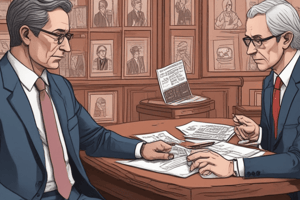Podcast
Questions and Answers
What does the term 'violent crime' refer to?
What does the term 'violent crime' refer to?
- Crimes involving theft or deception
- Crimes committed without any physical harm
- Crimes that involve white-collar activities
- Crimes where someone uses or threatens force (correct)
What does the concept of 'hot spotting' relate to in crime studies?
What does the concept of 'hot spotting' relate to in crime studies?
- The analysis of criminal motives
- Map-making for public safety
- Criminal profiling and its effectiveness
- Identifying areas with frequent crime (correct)
What is meant by 'criminal justice reform'?
What is meant by 'criminal justice reform'?
- Reducing penalties for all crimes
- Introducing new laws against minor offenses
- Building more prisons to accommodate offenders
- Improving the legal and prison systems (correct)
Which law significantly increased drug penalties in 1952?
Which law significantly increased drug penalties in 1952?
What does the term 'self-fulfilling prophecy' imply?
What does the term 'self-fulfilling prophecy' imply?
Which concept refers to the practice of jailing large numbers of people?
Which concept refers to the practice of jailing large numbers of people?
Which president is associated with the Republican party?
Which president is associated with the Republican party?
What does the term 'disproportionate impact' imply in the context of crime?
What does the term 'disproportionate impact' imply in the context of crime?
Which act primarily focused on taxing and restricting marijuana?
Which act primarily focused on taxing and restricting marijuana?
What is a primary characteristic of the 'Prison Industrial Complex'?
What is a primary characteristic of the 'Prison Industrial Complex'?
What does 'stop and frisk' entail in law enforcement?
What does 'stop and frisk' entail in law enforcement?
Which term describes a significant change in political beliefs?
Which term describes a significant change in political beliefs?
What is the purpose of pre-trial diversion programs?
What is the purpose of pre-trial diversion programs?
Which legal case allowed stop-and-frisk if reasonable suspicion exists?
Which legal case allowed stop-and-frisk if reasonable suspicion exists?
Which of the following best describes a reasonable solution in legal contexts?
Which of the following best describes a reasonable solution in legal contexts?
Which of the following best describes the term 'ideological shift'?
Which of the following best describes the term 'ideological shift'?
What is the primary focus of punitive measures in the criminal justice system?
What is the primary focus of punitive measures in the criminal justice system?
What does 'mass incarceration' refer to?
What does 'mass incarceration' refer to?
Which act was enacted in 1956 to impose stricter drug punishments?
Which act was enacted in 1956 to impose stricter drug punishments?
Which concept best explains the 'Prison Industrial Complex'?
Which concept best explains the 'Prison Industrial Complex'?
What does the term 'reasonable solution' imply in legal contexts?
What does the term 'reasonable solution' imply in legal contexts?
What is the goal of crime mapping?
What is the goal of crime mapping?
Which of the following describes 'stop and frisk'?
Which of the following describes 'stop and frisk'?
What is the significance of 'hot spotting' in law enforcement?
What is the significance of 'hot spotting' in law enforcement?
Which term refers to the unequal effects of laws on specific groups?
Which term refers to the unequal effects of laws on specific groups?
Flashcards
Violent Crime
Violent Crime
A crime where someone uses or threatens force against another person.
Crime Mapping
Crime Mapping
Using maps to pinpoint crime locations and trends.
Hot Spotting
Hot Spotting
Identifying areas with a high concentration of crime.
Stop and Frisk
Stop and Frisk
Signup and view all the flashcards
Ideological Shift
Ideological Shift
Signup and view all the flashcards
Trauma
Trauma
Signup and view all the flashcards
Punitive
Punitive
Signup and view all the flashcards
Mass Incarceration
Mass Incarceration
Signup and view all the flashcards
Prison Industrial Complex
Prison Industrial Complex
Signup and view all the flashcards
Reasonable Solution
Reasonable Solution
Signup and view all the flashcards
Self-fulfilling Prophecy
Self-fulfilling Prophecy
Signup and view all the flashcards
Disproportionate Impact
Disproportionate Impact
Signup and view all the flashcards
Criminal Justice Reform
Criminal Justice Reform
Signup and view all the flashcards
Pre-trial Diversion
Pre-trial Diversion
Signup and view all the flashcards
Terry V Ohio (1968)
Terry V Ohio (1968)
Signup and view all the flashcards
Marijuana Tax Act of 1937
Marijuana Tax Act of 1937
Signup and view all the flashcards
Boggs Act (1952)
Boggs Act (1952)
Signup and view all the flashcards
Narcotic Control Act (1956)
Narcotic Control Act (1956)
Signup and view all the flashcards
Rockefeller Drug Laws (1973)
Rockefeller Drug Laws (1973)
Signup and view all the flashcards
What was the effect of the shift in political beliefs?
What was the effect of the shift in political beliefs?
Signup and view all the flashcards
What are the consequences of the focus on punishment?
What are the consequences of the focus on punishment?
Signup and view all the flashcards
What is 'Pre-trial diversion?'
What is 'Pre-trial diversion?'
Signup and view all the flashcards
What is a reasonable solution?
What is a reasonable solution?
Signup and view all the flashcards
What is a self-fulfilling prophecy in the context of criminal justice?
What is a self-fulfilling prophecy in the context of criminal justice?
Signup and view all the flashcards
What is Criminal Justice Reform?
What is Criminal Justice Reform?
Signup and view all the flashcards
Study Notes
Crime Definitions and Concepts
- Violent crime: A crime where someone uses or threatens force.
- Trauma: Serious physical or emotional harm.
- Crime mapping: Using maps to study crime locations.
- Hot spotting: Identifying areas with frequent crime.
- Stop and frisk: Police temporarily stopping and searching people.
Political Figures and Affiliations
- Franklin D. Roosevelt: Democrat
- Harry S. Truman: Democrat
- Dwight D. Eisenhower: Republican
- John F. Kennedy: Democrat
- Lyndon B. Johnson: Democrat
- Richard Nixon: Republican
- Gerald Ford: Republican
- Jimmy Carter: Democrat
- Ronald Reagan: Republican
Political and Legal Concepts
- Ideological shift: A major change in political beliefs.
- Marijuana Tax Act of 1937: A law taxing and restricting marijuana.
- Punitive: Focused on punishment.
- Mass incarceration: Jailing large numbers of people.
- Prison Industrial Complex: Businesses profiting from inmates.
Justice System Reforms and Solutions
- Self-fulfilling prophecy: A belief that causes itself to come true.
- Disproportionate impact: Unequal effects on certain groups.
- Criminal justice reform: Improving the legal and prison systems.
- Pre-trial diversion: Programs to avoid trial for minor crimes.
- Boggs Act: 1952 law increasing drug penalties.
- Narcotic Control Act: 1956 law with stricter drug punishments.
- Rockefeller Drug Laws: Harsh New York drug penalties (1973).
- Terry v Ohio (1968): Court case allowing stop-and-frisk if reasonable suspicion exists.
Studying That Suits You
Use AI to generate personalized quizzes and flashcards to suit your learning preferences.
Description
Explore key definitions and concepts related to crime and notable political figures in U.S. history. This quiz covers violent crime, trauma, and essential political affiliations from Franklin D. Roosevelt to Ronald Reagan. Test your understanding of these pivotal topics.




